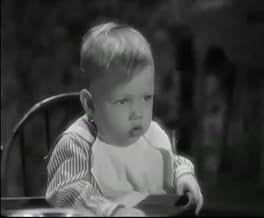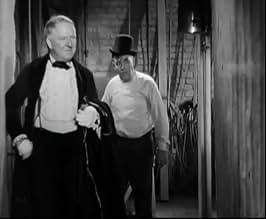Adicionar um enredo no seu idiomaThe Great McGonigle and his troupe of third-rate vaudevillians manage to stay one step ahead of the bill collectors and the sheriff.The Great McGonigle and his troupe of third-rate vaudevillians manage to stay one step ahead of the bill collectors and the sheriff.The Great McGonigle and his troupe of third-rate vaudevillians manage to stay one step ahead of the bill collectors and the sheriff.
- Direção
- Roteiristas
- Artistas
- Prêmios
- 2 vitórias no total
- Girl in Audience
- (não creditado)
- Mr. Livingston
- (não creditado)
Avaliações em destaque
I saw "The Old Fashioned Way" about 30 years ago for the first time and, except for the juggling act and Baby Leroy scene, thought it was pretty innocuous. Of course, I was only a teenager back then and actually thought that "Billy Jack" was the greatest dramatic movie of the 20th century. I'm also ashamed to say that I thought Chevy Chase was actually funny. Ugh! As my tastes matured, I began to realize that so many aspects of life are beyond our control, and all one could ever hope to do was to learn not to take life so seriously. That, I believe, is why W. C. Fields' sense of humor is timeless and continues to relate to future generations.
The next time you watch a W. C. Fields movie, look closely and you may find certain aspects of yourself within Fields' character. Why do you think Homer Simpson has lasted so long??? If you take what has been said in this review into consideration, you will cherish this film for years to come. Fix yourself a dry Martini and enjoy the movie.
Here is W. C. Fields in all of his pompous, vulgar glory: evasive, duplicitous, sneaky - utterly wonderful. Delivering dialogue in his unique buzz saw rasp, he gives out so many familiar lines that at times he almost seems to be performing a self-parody. This film brilliantly shows why Fields needed the sound cinema to let him be fully appreciated, and with Paramount giving him free rein to develop his material as he wished, it is not surprising that the film is a classic. Fans need look no further to find the essential Fields.
The romance between Judith Allen & Joe Morrison is a rather dull affair, although the young man sings well. Tammany Young plays Fields' loyal amanuensis. Movie mavens will recognize comedian Billy Bletcher as the tomato thrower & sour-visaged sheriff Clarence Wilson, both uncredited. Legend has it that Hollywood's first movie star, Florence Lawrence, derelict & forgotten, made one of her last unbilled appearances here before her 1938 suicide.
Fields found it useful to populate his films with at least one she-dragon, a female of frightful aspect against whom he could bounce off some of his best humor. This film has two: rail-thin, Nora Cecil - prim & dour as the troupe's suspicious landlady; and most especially silly Jan Duggan, horridly bejeweled & curled, as Field's wealthy target. Here was an actress, now nearly forgotten, who could easily equal in hilarity even Fields himself. It is generally overlooked how important her contribution is to the celebrated supper table scene with Fields & Baby LeRoy - one of the funniest sequences ever to appear in an American film. And her rendition of `Gathering Up The Shells On The Seashore' is a wonderful spoof of such sentimental songs as `When You And I Were Young, Maggie,' which were so popular in that era. Miss Duggan would return to briefly plague Fields in three additional films, including THE BANK DICK (1940). (She died in 1977 at the age of 95.)
Fields has included the old melodrama The Drunkard into the plot and to his credit he plays it straight,' letting its honest antique sentiment speak for itself. In his own private olio, Fields makes a curtain call to show off his astonishing talent of legerdemain. It is wonderful to have his routine captured on film as he really is quite amazing - it is easy to see how at one time he was considered the world's greatest juggler. Now he is remembered as one of cinema's supreme comics.
The film, as such, relies more on atmosphere than the typical Fields 'sketches' and this, perhaps, lends it a charm - and a freshness - that it wouldn't otherwise possess. Among its many notable scenes are: Fields thinking the military reception waiting at the train station is for his troupe's benefit; the dinner sequence with a rampaging, famished troupe and Fields' hilarious encounter with Baby LeRoy (who throws food at him and drops his watch into a jar of molasses) - Fields manages to get even with the child by kicking him when no one's watching!; the rich old lady's cringe-inducing singing audition, with the star reacting accordingly (he's hoping to secure her financial backing for the play the troupe will be presenting in town by promising her a role in it - this is eventually whittled down to a single line, which she's never even called upon to deliver!); Fields falling off the stage during rehearsals, etc.
"The Drunkard" set-piece occupies a good deal of the second half: a hoary melodrama which the troupe performs with gusto - with Fields as the mustachioed and hissable villain of the piece who, at one point, reprises the immortal line from his short THE FATAL GLASS OF BEER (1933) "'T ain't a fit night out for man nor beast". With the closing of each act, the curtain comes crashing down making a loud thumping sound; still, the film is clearly intended as a valentine to the days of vaudeville - and even includes a wonderful juggling routine towards the end that showcases Fields' amazing dexterity (in spite of his advancing age, corpulent physique and propensity for booze).
The final sequence finds The Great McGonigle keeping busy as a medicine showman - having left his daughter behind, so as not to interfere with her happiness alongside a stage-struck boy emanating from a respectable family. Typically, for comedies from this era, romance and songs have been incorporated into the narrative as much as a device by which to counterbalance the star's antics as for purely commercial reasons (since these films were largely intended for family consumption).
It also contains one of the oddest-named characters in any movie, Cleopatra Pepperday, played wonderfully by Jan Duggan. The scene where she sings Gathering Up The Shells By The Seashore is wonderful. Or when she's rehearsing her "line" in the play, "Here comes the prince!" There is also a fascinating little cultural artifact within the movie -- a production of The Drunkard, a 19th century hit, no doubt popular when William Claude was a mere lad.
As per usual, W.C. Fields is incredible. The fascinating thing about him, to me, is the subtlety of his performance. It doesn't LOOK subtle, I'll grant you, but what strikes me is that there are many layers to his performing in movies. On the one hand, there are the huge gestures and loud, familiar voice, but on the other hand there are the muttered asides, the precise facial reactions, the absurd failure to accomplish the simplest tasks, like put his hat on his head without getting it caught on a cane. That's what I mean by subtle, you almost miss it and then you can't explain to yourself what it is that is so incredibly funny about what he's doing.
There's a bit of controversy about the scene where he kicks Baby LeRoy in the bottom, knocking him across the hall. There are many stories of W.C.'s working with Baby LeRoy. Apparently, on one occasion, Fields poured gin into Baby LeRoy's bottle, and when the child began throwing up and falling over, W.C. snorted, "I told you he was no trouper!"
I think it's awful that so many of W.C. Fields' films are not yet released on DVD. This is an oversight that should be rectified soon, we hope!
Você sabia?
- CuriosidadesW.C. Fields recreates his famous vaudeville juggling routine with the cigar boxes.
- Erros de gravaçãoBetty is described as the leading lady of the troupe--as one would expect, since she is The Great McGonigle's daughter. But she takes no part in the show; another actress plays the female lead.
- Citações
Dick Bronson: Mr. McGonigle, I've got to have some money.
The Great McGonigle: Yes, my lad, how much?
Dick Bronson: Two dollars.
The Great McGonigle: If I had two dollars, I'd start a number two company.
Dick Bronson: For two cents I'd quit.
The Great McGonigle: [to Marmaduke] Pay him off!
[Marmaduke gives him a two cent stamp]
- Cenas durante ou pós-créditosThe end credits are in 2 parts; the first contain the actors and their character names in the film as a whole; The second contains the actors and their character names in the play, "The Drunkard." Five actors, therefore, are credited twice: W.C. Fields, Joe Morrison, Judith Allen, Samuel Ethridge and Ruth Marion.
- ConexõesFeatured in Hollywood: The Gift of Laughter (1982)
- Trilhas sonorasWe're Just Poor Folks Rolling in Love
(1934) (uncredited)
Lyrics by Mack Gordon
Music by Harry Revel
Sung by Joe Morrison
Principais escolhas
Detalhes
- Data de lançamento
- País de origem
- Idioma
- Também conhecido como
- The Old Fashioned Way
- Locações de filme
- Empresa de produção
- Consulte mais créditos da empresa na IMDbPro
- Tempo de duração1 hora 11 minutos
- Cor
- Proporção
- 1.37 : 1
Contribua para esta página































